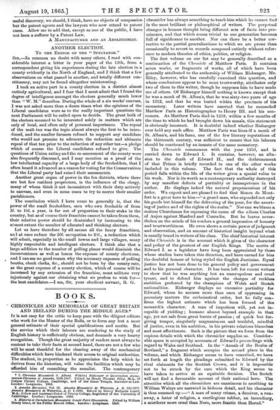ANOTHER ELECTION.
To THE EDITOR OF THE "SPECTATOR."
SIR,—In common no doubt with many others, I read with con- siderable interest a letter in your paper of the 12th, from a correspondent giving his experiences during the late election in a county evidently in the North of England, and I think that a few observations on what passed in another, and totally different con- stituency, may not be found altogether uninteresting.
I took an active part in a county election in a district almost entirely agricultural, and I fear that I must admit that I found the degree of intelligence amongst the electors generally much lower than "W. M." describes. During the whole of a six weeks' canvass, I was not asked more than a dozen times what the opinions of the Liberal candidates were as to the really important questions the next Parliament will be called upon to decide. The great bulk of the electors seeemed to be interested solely in matters which are only of local, and often only of personal importance. The repeal of the malt tax was the topic almost always the first to be intro- duced, and the smaller farmers refused to support any candidate who would not promise to advocate the reduction and ultimate repeal of that tax prior to the reduction of any other tax—a pledge which of course the Liberal candidates refused to give. The questions of Union rating and the re-assessment of the county were also frequently discussed, and I may mention as a proof of the low intellectual capacity of a large body of the freeholders, that I often heard it advanced as a reason for voting for the Conservatives that the Liberal party had raised their assessments.
Another great organ of power in the fen districts, where there
are but few resident proprietors, is the influence of the clergy, many of whom think it not inconsistent with their duty actively to canvass, and even in some cases to try to coerce their smaller parishioners.
The conclusion which I have come to generally is, that the power of the small freeholders, men who own freeholds of from 2/. to 10/. a year, is far out of proportion to their stake in the country, but as of course their franchise cannot be taken from them, their relative power should be diminished by increasing to the utmost extent the number of educated and thinking electors.
Let us have therefore by all means all the fancy franchises, and at once reduce the 50/. occupation to 20/., a reduction which will admit, especially in the small towns and large villages, many highly respectable and intelligent electors. I think also that a large addition to the number of polling places would diminish the inconvenience as well as lessen the expense of county elections, and I can see no good reason why the necessary expenses of polling booths, check clerks, &c., should not be born by the county rate, as the great expense of a county election, which of course will be incretsed by any extension of the franchise, must militate very injuriously against our obtaining what we profess to wish for— the best candidates.—I am, Sir, your obedient servant, R. G.






























 Previous page
Previous page